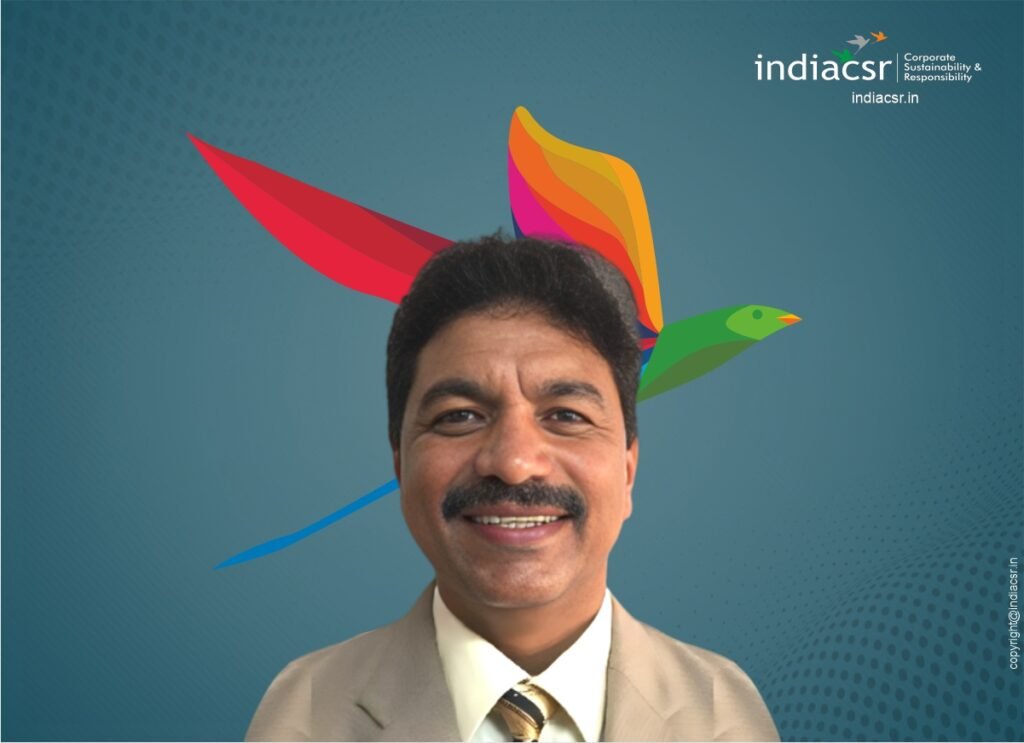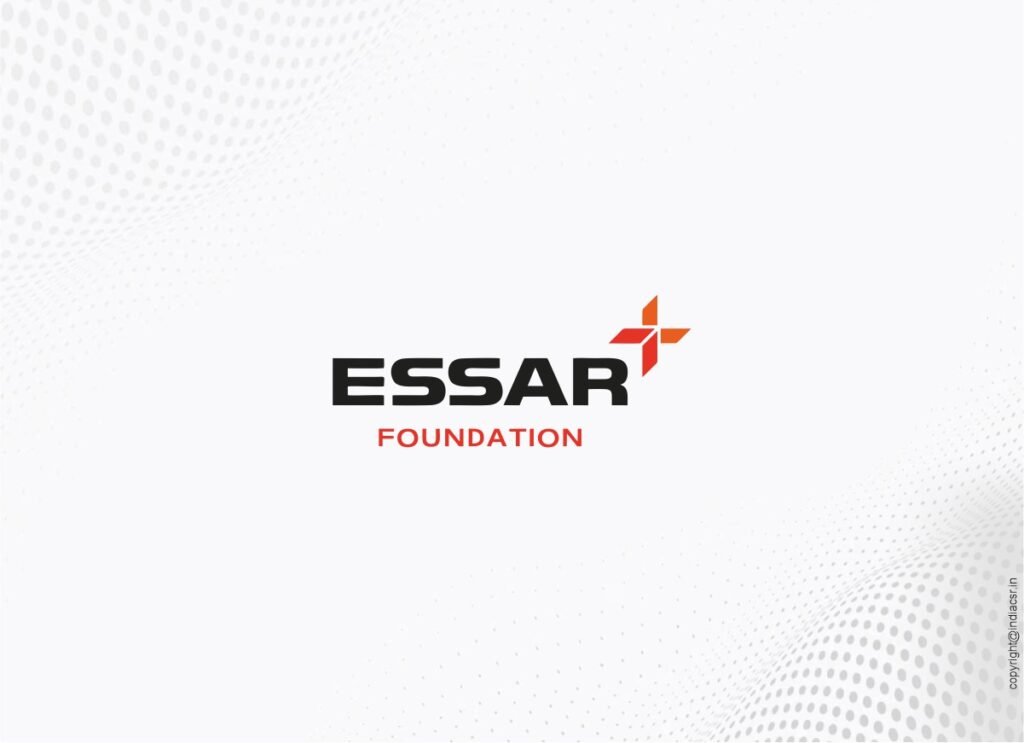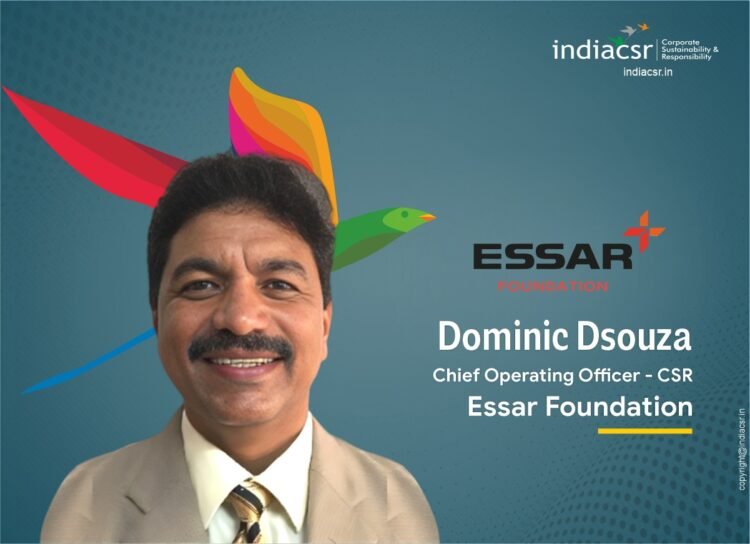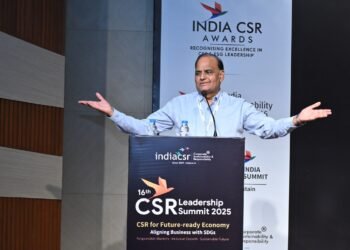
Words Rusen Kumar
The Future of CSR in India with Dominic Dsouza: Explore the evolving landscape of Corporate Social Responsibility.
MUMBAI (India CSR): In this enlightening conversation, Dominic Dsouza, Chief Operating Officer – CSR of Essar Foundation, engages with Rusen Kumar, Editor of India CSR, to share his extensive insights into the evolving field of Corporate Social Responsibility in India.
With a focus on the changes over the last decade, the impact of mandatory CSR regulations, and the future directions of corporate philanthropy, Dsouza elucidates the multifaceted approach of the Essar Foundation in fostering sustainable and community-driven development. Through a discussion on various aspects, including emerging trends and best practices, this interview sheds light on the potential of CSR to significantly influence India’s development trajectory.
Through this dialogue, Dsouza articulates the integral role of CSR in fostering sustainable development and the impactful strategies deployed by the Essar Foundation to enrich the communities surrounding its operations.
Excerpts:
1. How has the CSR landscape in India evolved over the past decade? What are some of the key milestones and achievements?
Over the past decade, the Corporate Social Responsibility (CSR) landscape in India has experienced significant evolution, transitioning from voluntary practices to a more comprehensive approach to sustainable development. Initially viewed as discretionary activities showcasing a company’s commitment to stakeholders beyond shareholders, CSR now encompasses a broader spectrum, integrating social, environmental, and economic considerations into corporate decision-making processes.
During this period, there has been a notable increase in resources allocated to development initiatives mandated by CSR requirements. This surge in investment has not only addressed social and environmental challenges but has also yielded socially responsible profits. This trend is expected to persist as more companies acknowledge the importance of aligning business objectives with societal needs. Essar has been actively involved in this movement, implementing CSR initiatives that positively impact the communities in which it operates.
2. What has been the impact of mandatory CSR on businesses, NGOs, and communities?
The introduction of mandatory CSR regulations has spurred businesses to adopt a more strategic approach, encouraging collaboration and innovation. Corporations are increasingly leveraging their resources and expertise to address societal challenges, resulting in more effective CSR initiatives. This collaborative effort has not only strengthened relationships between businesses, NGOs, and communities but has also fostered the development of inclusive and sustainable business models. By aligning their goals with societal needs, businesses have catalysed a positive transformation in corporate behaviour, generating meaningful impacts across sectors and communities.
3. Have there been any unintended consequences or challenges associated with the current CSR framework?
While the current CSR framework has brought about remarkable benefits such as increased corporate philanthropy and improved community engagement, it also presents some challenges. One significant challenge is the potential perception of CSR initiatives as mere compliance obligations rather than genuine commitments to social responsibility. This perception can dilute the effectiveness of CSR endeavours and diminish their impact on communities. Additionally, the absence of standardised reporting requirements and measurement metrics complicates the accurate assessment of CSR activities’ true impact.
Another challenge arises from the uneven distribution of corporate-NGO partnerships, where larger and more established NGOs often receive a disproportionate share of CSR funding and projects. This imbalance can marginalise smaller NGOs and local initiatives, impeding the equitable allocation of resources. Moreover, there is a pressing need to prioritise underdeveloped rural and remote areas to ensure that CSR initiatives reach all sectors and geographical locations equitably. Often the corporate initiatives are limited to the area where they have geographical presence, while it would be better if specific direction is provided to ensure an equal spread across the nation.
Addressing these challenges is essential for maximising the positive outcomes of CSR initiatives and promoting sustainable development nationwide.
4. What are some emerging trends in CSR that are likely to shape the future of corporate giving in India?
Several emerging trends are reshaping India’s CSR landscape, which are likely to influence the future of corporate giving. One prominent trend is the increasing integration of Environmental, Social, and Governance (ESG) considerations into corporate strategies, guiding companies towards sustainable practices. Technology-driven solutions, are enhancing transparency and efficiency in CSR projects. Additionally, there is rising support for impact investing and social entrepreneurship, aligning business objectives with societal needs.
Collaborative partnerships among businesses, NGOs, and governments are also on the rise, pooling resources for greater impact. Simultaneously, there is a growing emphasis on employee engagement in CSR through volunteering and skill-based initiatives, fostering a sense of purpose among employees.
Additionally, there’s a growing emphasis on measuring and reporting the impact of CSR initiatives, promoting accountability and transparency. Addressing these trends will be essential for companies to advance their strategic and impactful corporate giving practices in India.
5. How can technology be leveraged to enhance the effectiveness and transparency of CSR initiatives?
Utilising technology is a key driver for enhancing the effectiveness and transparency of CSR initiatives. Through innovative solutions like data analytics, companies can efficiently collect and analyse extensive datasets relevant to their CSR endeavours. This empowers them to assess impact, identify areas for improvement, and allocate resources more effectively. Additionally, leveraging cutting-edge technologies streamlines implementation processes, enhancing project efficiency and ensuring the successful realisation of sustainability goals.
Moreover, technology facilitates improved communication, coordination and engagement with stakeholders, including employees, local communities, and investors. Digital platforms such as social media, forums, and interactive websites enable real-time interaction, feedback collection, and the dissemination of information about CSR initiatives. Digitalisation and IoT of CSR projects can considerably improve spread and impact. This fosters greater transparency, measurability and inclusivity, ultimately strengthening relationships and maximising the effectiveness of CSR efforts.
6. What role can collaboration and partnerships play in maximizing the impact of CSR?
Collaboration and partnerships are fundamental to maximising the impact of CSR initiatives. By joining forces with like-minded organisations, we can harness a broader range of resources, expertise, and perspectives. This allows us to address complex social and environmental challenges more effectively and on a larger scale. Furthermore, partnerships enhance our credibility and enable us to innovate and reach communities more efficiently. Together, we can make a tangible difference and create lasting positive change.
7. What are some key areas where CSR can make a significant contribution to India’s development goals?
Corporate Social Responsibility (CSR) plays a key role in India’s development trajectory by addressing critical societal challenges. Education stands as a cornerstone, where CSR initiatives can bolster access to quality education in remote and underserved areas. By investing in infrastructure, scholarships, and digital literacy programs, corporations can empower the next generation, fostering economic inclusion and innovation.
Furthermore, healthcare accessibility remains a pressing concern, particularly in rural regions. Through CSR, companies can support healthcare infrastructure development, preventive care programs, and health awareness campaigns, thereby improving overall public health outcomes.
Environmental sustainability is also a key focus, with CSR efforts targeting initiatives like renewable energy adoption, waste management, and biodiversity conservation.
By aligning CSR efforts with these key areas, corporations can catalyse positive societal change and contribute significantly to India’s development goals.
8. How can companies ensure their CSR initiatives are aligned with the needs of communities and contribute to sustainable development?
From an industry perspective, aligning CSR initiatives with community needs and sustainable development is fosters a positive impact. By conducting thorough assessments and engaging stakeholders, companies can ensure their efforts are targeted and meaningful. Collaborating with local communities not only addresses specific challenges but also taps into valuable local knowledge. Adopting a participatory approach promotes a sense of ownership and enhances the sustainability of initiatives.
Furthermore, integrating CSR strategies with the UN Sustainable Development Goals provides a robust framework for addressing global challenges while tailoring actions to local contexts. Regular evaluation and transparent reporting are essential for accountability and driving continuous improvement within the industry, enhancing genuine partnerships and sustainable outcomes.
9. What are some best practices for measuring and reporting the impact of CSR activities?
When measuring and reporting the impact of CSR activities, ensure alignment with organisational goals and stakeholder expectations. Use a combination of quantitative and qualitative metrics to capture both tangible outcomes and intangible benefits such as community development, reputation enhancement and employee engagement. Regularly communicate results transparently, highlighting successes, challenges, and areas for improvement. Engage with stakeholders to gather feedback and ensure relevance and credibility of reported data. Continuously evaluate and adjust measurement methodologies to reflect changing contexts and priorities. Finally, integrate CSR impact reporting into broader organisational reporting structures to demonstrate its significance and contribution to overall business objectives.
10. What are your hopes and expectations for the future of CSR in India? What needs to be done to ensure its continued growth and effectiveness?
The future of CSR in India holds great promise and entails significant responsibility. By aligning CSR endeavours with global sustainability objectives and harnessing technology, collaboration, inclusion, and stakeholder engagement, organisations can pave the way for a more responsible and sustainable future.
To ensure continued growth and effectiveness in CSR, several steps are necessary. Firstly, there must be a shift in mind-set where CSR is perceived not merely as a regulatory obligation but as a strategic imperative for sustainable development. Secondly, fostering collaboration among businesses, governments, NGOs, and local communities is essential to address complex societal challenges comprehensively. Thirdly, investing in innovative solutions and leveraging technology can enhance the impact and scalability of CSR initiatives. Lastly, transparency, accountability, and regular evaluation are crucial for measuring and enhancing the effectiveness of CSR efforts over time.
By embracing these principles and taking concerted action, the future of CSR in India can indeed be transformative, leading to positive outcomes for both society and the environment.
***

Dominic Dsouza: 4 Decades of Experience in the Social Sector
Dominic Dsouza is the Chief Operating Officer – CSR at Essar Foundation. He has over 40 years of work experience in Corporate Affairs, Corporate Social Responsibility (CSR), Corporate Communications, Public Relations, Brand Management, Crisis Management, Employee Engagement, Administration, Networking, Liaison, and Image Building with a cross-section of society, including Government, Foreign Missions, Consular Corps, Foreign Commercial Services in India and abroad, Joint Business Councils, World Economic Forum, Apex Bodies (FICCI, CII, ASSOCHAM), Chambers of Commerce, Industry Associations, and Trade Associations.
He has led teams in Corporate Affairs, Corporate Communications, CSR, OHSE, and Administration in various organisations, including Wockhardt Ltd, Raymond Ltd, J.Ray McDermott Inc Dubai, NZ Telecom, Savioray Petrochemicals Ltd, and Cambatta Aviation. He is a former state footballer, having represented the State of Maharashtra in the Senior, Junior, Sub-Junior, and School Nationals. Additionally, he is a qualified football coach, having coached the Maharashtra Football team. He also serves as a Music Conductor in charge of the Church Choir. Dominic has received several awards, including the recent Governor’s Award for Covid Relief work presented by the Governor of Maharashtra.
***

Essar Foundation: A Legacy of Community Engagement and Development
Over the last 50 years, Essar has worked closely with the communities residing in the vicinity of its operations. Essar Foundation has carried on the philanthropic work in a cohesive, programmatic manner. Its activities are inspired by the concept of shared value whereby Essar strives to build an inclusive environment for the communities that it impacts through its business operations in the sectors of Energy, Infrastructure, Metals & Mining, and Technology & Retail. Working in collaboration with non-profits and the local administrations, the Foundation today reaches out to thousands of people across remote villages in India, serving in the areas of women’s empowerment, livelihoods, education, environment conservation, sports, and healthcare & sanitation.
***

About the Author
Rusen Kumar is the Managing Editor at India CSR, the largest news platform in India dedicated to Corporate Social Responsibility. With years of experience in journalism, Rusen has become a prominent voice in CSR discourse, consistently highlighting impactful initiatives and fostering discussions that drive social change and sustainable development across the nation.
***
(Copyright@IndiaCSR)






















